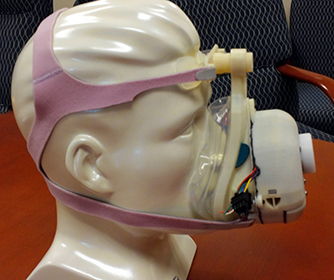UTSA researchers developing smaller, portable sleep apnea machine

Prototype phase I
(Jan. 19, 2017) -- UTSA researchers are working on a way to miniaturize the machines that currently help sleep apnea sufferers breathe easier at night.
Sleep apnea is a chronic breathing condition that affects an estimated 22 million Americans, with many more still undiagnosed. During sleep, people with sleep apnea will suffer from disruptive pauses in breathing. Left untreated, the condition can lead to other types of health issues.
Arturo Ayón, physics professor in the UTSA College of Sciences and director of the UTSA MEMS Research Laboratory, and his team—UTSA alumna Jessica Smith ’16 and Dr. James Andry, M.D., of the Sleep Therapy and Research Center—are developing a portable sleep apnea treatment option. The team have submitted a proposal to the National Science Foundation to continue the development at UTSA.
The most common treatment for sleep apnea comes in the form of continuous positive airway pressure—or CPAP—therapy machines. These bulky devices contain an external airflow generator that must be plugged into the wall, a full-face mask and hose.
“The average sleep apnea machine, though an effective treatment, can be large, cumbersome and hard to transport,” Ayón said. “There’s a great need for a new approach to these machines. We believe that miniaturization would help sleep apnea sufferers get a better night’s sleep.”
Ayón and his team designed a machine that uses a built-in air compressor to prevent obstruction of the airway in place of the average CPAP machine’s external airflow generator. The researchers’ first two portable CPAP machine prototypes, unveiled in late 2016, are smaller, less obstructive and hose-less machines with built-in compressors.
Ayón says that pressure and noise data demonstrate the first two CPAP mask prototypes were significantly quieter than the common machine. In addition, the second prototype was equipped with a pressure and feedback mechanism, providing the added capability for users to adjust airflow pressure as necessary.
The technology for the mask prototypes is based on a prior research project that resulted in a U.S. patent (application number 14/700,112), titled “Self-Contained Continuous Positive Airway Pressure Mask and Method of Use.” The aforementioned project was undertaken by Ayón and colleagues Joseph Barrios, Eliud Gutierrez, Aaron Mosqueda and Maxim Perkins.
Over the next year or two, Ayón’s current team wants to further refine the CPAP machine’s concept through this new project. They also want to introduce the masks to potential consumers. The researchers recently applied for funding to take these next steps.
“In the future, we hope to replicate and enhance the designs of our initial prototypes, and to conduct the next phase of research necessary to bring the machine to market,” Ayón said. “It is a process, but it is a process that we are hopeful will ultimately bring relief to a great many people.”
UTSA is ranked among the top 400 universities in the world and among the top 100 in the nation, according to Times Higher Education.
-------------------------------
Learn about the UTSA MEMS Research Laboratory, housed in the College of Sciences’ Department of Physics and Astronomy.
Connect with UTSA online at Facebook, Twitter, YouTube, Instagram and LinkedIn.
Events
Huddle Against Hunger is a fundraising competition with Texas State that benefits our Roadrunner Pantry. Donations this week will help UTSA earn additional prize monies provided by RBFCU.
In-Person and VirtualJoin UTSA Libraries for an update on federal public access policies and how the library can assist with compliance.
Virtual EventWe invite you to join us for Birds Up! Downtown, an exciting welcome back event designed to connect students with the different departments at the Downtown Campus. Students will have the opportunity to learn about some of the departments on campus, gain access to different resources, and collect some giveaways!
Bill Miller PlazaThere are many citation managers. Which one is right for you? This workshop will explain what a citation manager is and how it can help you organize your citations, insert citations as you write your paper, and generate your bibliography.
Virtual EventPubMed is an essential database for anyone conducting biomedical or health-related research. This workshop will teach attendees how to effectively navigate this free resource and locate peer-reviewed articles using advanced search features, MeSH subject headings, and Boolean operators.
Virtual EventIn this hands-on workshop, participants will learn to setup an EndNote library, save references and PDFs, and automatically create and edit a bibliography. Attendees are encouraged, but not required, to have EndNote already installed on a personal computer.
Virtual EventJoin UTSA Libraries and Museums to learn more about the publishing discounts available for UTSA researchers. Current agreements include Elsevier, Cambridge University Press, Wiley, and more. Bring your questions and feedback for the library as we continue to pursue partnerships with publishers to reduce costs for our researchers.
Virtual Event

